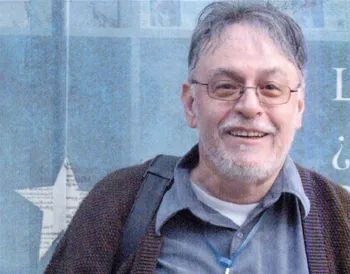Before Saying Any of the Great Words: A Bilingual Poetry Reading

David Huerta and Mark Schafer
Thursday, April 16th at 4:30
Mc Cabe Library
David Huerta (Mexico, 1949) is a renowned Mexican poet. He received the 2005 Xavier Villaurrutia Prize, Mexico's most prestigious literary award, for all his poetic work written over the course of four decades. Other honors are a grant from the Centro Mexicano de Escritores in 1971, the Diana Moreno Toscano Award in 1972, a Guggenheim Fellowship in 1978, and the Carlos Pellicer Prize in 1990. He has been a member of Mexico's prestigious Sistema Nacional de Creadores de Arte since 1994. In addition to his work as a journalist, literary critic, translator, and cultural activist, Huerta teaches literature at the Universidad Autónoma de la Ciudad de México. He writes a column for the political weekly Proceso, and his literary criticism appears often in Letras Libres, a literary journal. He is well known for his struggle to preserve free cultural spaces in Mexico, available to everyone. About his own work, Huerta says:
I am a writer of traditional poetry. I write poetry of images, metaphors, metonymy, all sorts of tropes and figures of language. But I do not worship imagery. Instead, I believe it helps us to say some things that can help us live outside the logic of markets, if that is still possible.
Before Saying Any of the Great Words (Copper Canyon Press, 2009), a comprehensive bilingual anthology of Huerta's poetry, is the first book-length publication of his work in English. It contains eighty-four poems drawn from the entire range of Huerta's published poetry to date, ranging from his first collection, El jardín de la luz (1972), to his most recent volume of poetry, La calle blanca (2006). In addition to dozens of recent poems, this volume includes an extensive series of excerpts from Huerta's monumental book-length poem Incurable, called by critic Christopher Domínguez "a masterpiece of poetry in Spanish in the twentieth century." The translation is the work of Mark Schafer.
Schafer is also a professor of literature at the University of Massachusetts in Boston and a visual artist. He has become a professional translator with many volumes to his name, most of them of Mexican poets and narrators. He lived in Mexico in the 80's, and he talks about that experience as crucial for the development of his trade:
My experience living in Mexico affected my work as a literary translator in a number of ways. First, I connected profoundly with the community in which I lived. Spanish—a particular Spanish, rooted in place and history-surrounded me day and night and entered me deeply. I developed close relationships with my neighbors in Tepoztlán, with whom I lived, worked, celebrated, and mourned. All the Spanish I had previously learned in the classroom and office now acquired a living context, transforming and deepening my relationship with the language.
Here is the title poem from Before Saying Any of the Great Words:
Before Saying Any of the Great Words
We already know: first we must agree
on which they are; but let us acknowledge that they exist:
they resound in all their weight and gravity
down Nevsky Prospekt, in the muttering of Raskolnikov,
and Cortázar mocks them at every opportunity,
lightens them up, musses their hair, reconciles them
with the rest of the vocabulary so that they may rub benignly
against one another and liberty won't do too much harm
with its tonnage of Greek marble
and its whiff of existentialism and its undeniable tragic greatness
to janitor, tenedor, bibelot—although the greatness of this last one
is suspect, for which we have Mallarmé to blame,
there are also the short and decisive words: yes, no, now, never,
turbid love, clean death, rattled poetry,
other words that are like art for art's sake: sandalwood,
for instance, and words like deoxyribonucleic, telescopic
and possessing an undeniably scientific elegance, a diffuse,
intense, and labyrinthine character, all at once, linked
to that other word, life, and of course there are the combinations,
your mouth, this letter, dozens of verbal objects
that are only important for inexplicable reasons,
spoken at night or during the day, said
or held in silence, in the velvety net
of memory, in the transparent and energetic fortress
of forgetting, that body or fabric from which
are also made the great words, time, so many things.
David Huerta
Translated by Mark Schafer



